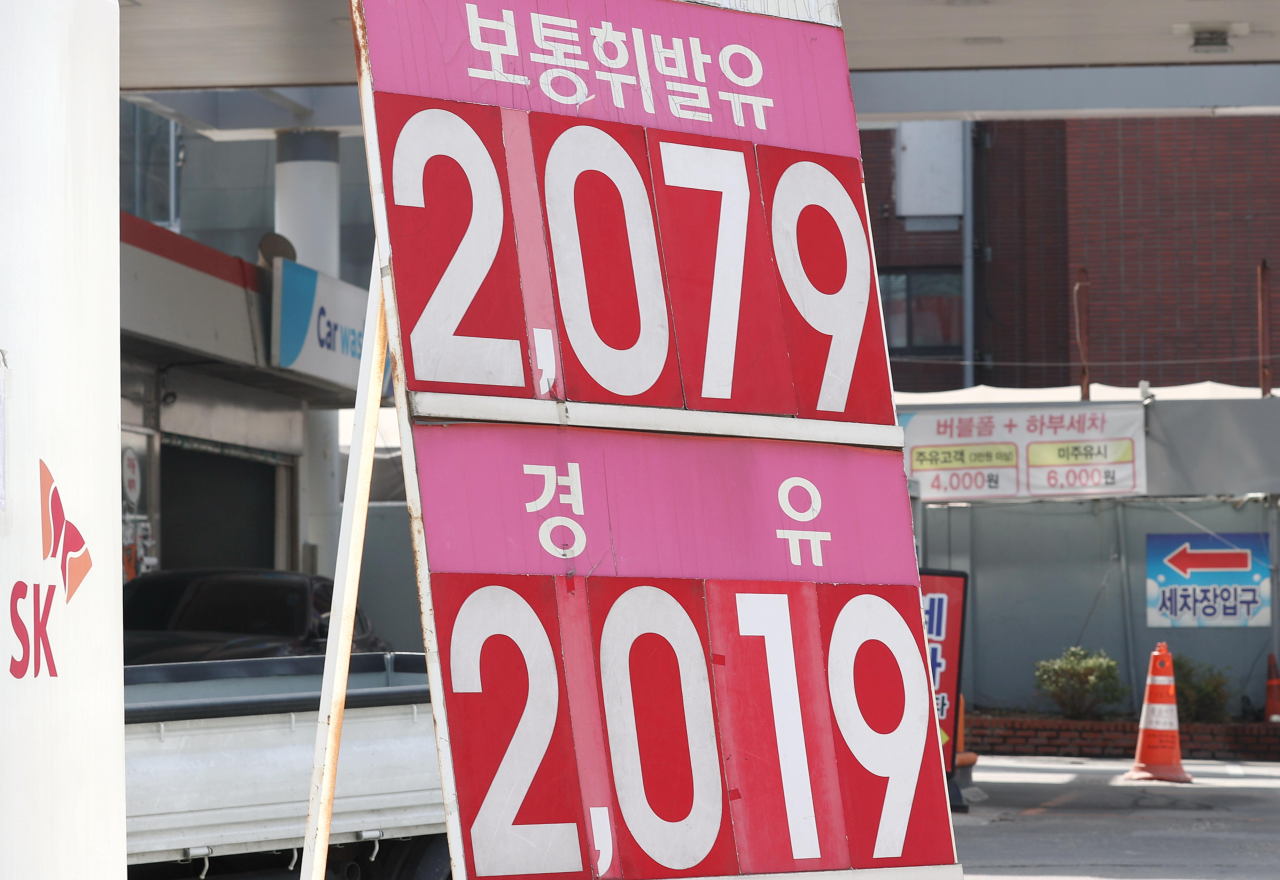[Feature] Commuters, truck drivers take the brunt of expensive oil
Interest in bikes, electric vehicles grow amid record high fuel prices
By Choi Jae-heePublished : March 30, 2022 - 19:38

Lee, a 41-year-old math teacher at a public high school in Yongin, Gyeonggi Province, has been commuting by bike since last week after retail oil prices slid over the 2,000-won mark.
From his home in Mohyeon-eup of Cheoin-gu to Pogok-eup, where the school is located, it takes about 10 minutes by car, but 30 minutes by bike. Instead of spending more time in bed, he chose to save money on gas by waking up early.
“I used to pay 200,000 won per month for fuel, which went up to almost 300,000 won recently. With the cold weather almost over, I decided to pedal to work, not only to reduce fuel costs, but also to exercise,” he said.
Lee is among a growing number of Koreans who have switched to biking for daily commute amid a continued rise in retail fuel prices.

According to the Korea National Oil Corp., the average nationwide gasoline price rose to 2,001.9 won ($1.64) per liter in the fourth week of March, edging up 7.5 won from a week earlier.
It was the first time since October 2012 that the figure has surpassed the 2,000-won mark.
The price of diesel oil also skyrocketed to 1,920 won per liter during the same period, hitting the highest level since July 2008.
Sky-high fuel costs are a global phenomenon.
International oil prices had been on an upward spiral during the pandemic, but they hit new record highs in recent weeks due in part to Russia’s invasion of Ukraine and ensuing global economic sanctions on the country, which is the world’s third-largest oil producer behind the US and Saudi Arabia.
The price of Dubai crude, South Korea’s benchmark, averaged $112.1 per barrel last week, up $8.2 from a week earlier, industry data showed.
Feeling the pinch at the pump, some people travel to another city to get a better deal.
Park, 31, an office worker living in Hanam, Gyeonggi Province, drove 20 minutes to a gas station in Gwangju on Saturday morning, where the price of gasoline was some 150 won cheaper per liter.
He used a mobile application called Opinet, the KNOC’s website offering real-time gasoline price comparisons, to locate the cheapest gas stations near him.
“Since I’m working as a sales manager, I often have to use my car to have lunch meetings with business partners or to attend other outside events. It was early in the morning when I arrived at the gas station in Gwangju last Saturday, but a number of cars were already lined up at the entrance,” Park said.
Some diesel car owners who make a living by driving urged the government to come up with measures to soften the impact of global oil supply woes.
“I usually earn 400,000 won for carrying a 40-foot container from Busan to Daegu. I used to spend some 120,000 won of the money on gas, but now I pay more than 200,000 won. In my 40 or so years as a truck driver, it’s the first time I’ve been hit this hard by oil prices,” said a 62-year-old truck driver surnamed Baek.
“Cargo truck drivers are forced to drive dangerously and overwork to counter rising fuel costs. The government should come up with emergency countermeasures to minimize damage, including a hike in freight rates and reduction in fuel taxes,” said Lee Bong-joo, head of the Cargo Truckers Solidarity, which represents self-employed truck drivers and those working for trucking companies.
The government has introduced a temporary cut in domestic taxes on gasoline, diesel and liquefied petroleum gas by 20 percent since mid-November. The measure, originally scheduled to end next month, has been extended to end-July.
Finance Minister Finance Minister Hong Nam-ki left open the possibility of a further cut if the oil prices continue to rise sharply.
“Should economic uncertainty mount further from international oil prices growing at a faster pace than current levels, we will consider expanding the extent of fuel tax cuts,” the he said earlier this month during a press conference.
Meanwhile, expensive fuel is encouraging some people to switch over to electric vehicles that are relatively free from the fluctuations in oil prices.
“I’m considering buying an electric car with a government subsidy,” said Han, an office worker in his 30s living in central Seoul.
According to a report released by AJ SellCar, a local used car dealership, the sales volume of gasoline-powered used cars decreased 6 percent in March from the previous month, while that of electricity-powered ones increased 60 percent.
By Choi Jae-hee (cjh@heraldcorp.com)








![[Graphic News] More Koreans say they plan long-distance trips this year](http://res.heraldm.com/phpwas/restmb_idxmake.php?idx=644&simg=/content/image/2024/04/17/20240417050828_0.gif&u=)
![[KH Explains] Hyundai's full hybrid edge to pay off amid slow transition to pure EVs](http://res.heraldm.com/phpwas/restmb_idxmake.php?idx=644&simg=/content/image/2024/04/18/20240418050645_0.jpg&u=20240419100350)








![[KH Explains] Hyundai's full hybrid edge to pay off amid slow transition to pure EVs](http://res.heraldm.com/phpwas/restmb_idxmake.php?idx=652&simg=/content/image/2024/04/18/20240418050645_0.jpg&u=20240419100350)

![[Today’s K-pop] Illit drops debut single remix](http://res.heraldm.com/phpwas/restmb_idxmake.php?idx=642&simg=/content/image/2024/04/19/20240419050612_0.jpg&u=)